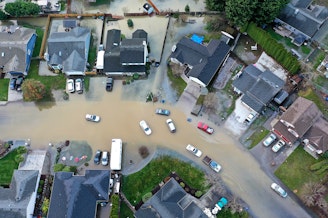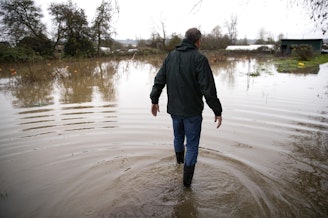Is this week's heat wave fueling your climate anxiety? Yeah, us too.

We're experiencing record temperatures in the Pacific Northwest this week. In Europe, unprecedented heat is fueling wildfires in Spain, Italy, Portugal, Greece, France, and Germany.
The new climate reality is here.
For many of us, that reality is leading to feelings of hopelessness, stress, and late night doom-scrolling.
Researchers have terms for these feelings — "eco-grief" and "climate anxiety."
Soundside spoke to Dr. Kate Hoerster, a psychologist and public health researcher with the VA Puget Sound Health Care System about how we grapple with these emotions.
What is eco-grief?
Sponsored
Just like the death of a loved one or losing your job, climate change is a major stressor, Hoerster says. The terms "eco-grief" and "climate anxiety" are terms to describe the natural distress people are having as they face the current and expected climate crisis.
"Emotional reactions might include grief, guilt, anger, maybe even feelings of increased gratitude for the natural world, " Hoerster said. "Behavioral responses range as well, so people may isolate or engage in compulsive behaviors. On the sort of positive side, we might see people engage with increased advocacy."
Hoerster recommends talking to a mental-health specialist or friends and family about your anxiety. It's also important to act on those emotions, too. For Hoerster, engaging in climate action by volunteering through her work has helped her cope with climate anxiety over time.
But is exploring our eco-grief really the best use of our time?
There's no denying that we're seeing catastrophic consequences to inaction against climate change from global leaders and corporations.
Sponsored
And while being more conscious of our carbon footprint is important, research shows that many of the world's largest companies aren't pulling their weight when it comes to reducing carbon emissions.
So, is taking the time to talk about are climate anxiety really the best use of our time?
Hoerster says we have to strike a balance.
"From a mental health standpoint, to heal emotionally, and to live a full life, it's actually very important not to push painful feelings away," she explained. "Eventually, those those feelings show up and can manifest and sort of exacerbations of that initial distress."
Individuals and institutions have to address the cost of climate change not just on our environment, but on our collective mental health. And according to Hoerster, we also have to remember that people have the agency to advocate, mitigate, and adapt in the face of climate change.





